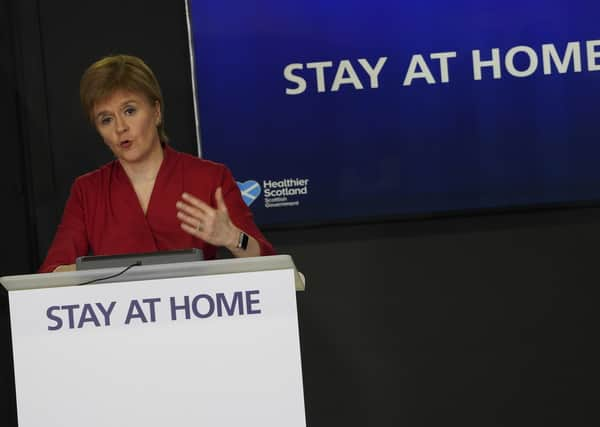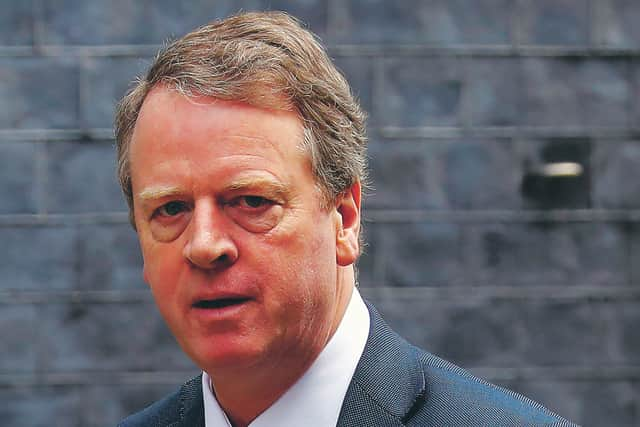Euan McColm: SNP and Tories must put conflict aside for Scotland’s future


Scottish Secretary Alister Jack had accused Nicola Sturgeon of “reckless talk” about the potential quarantining of English tourists visiting Scotland while coronavirus restrictions remain in place.
Sturgeon was having none of it. She tweeted: “What is ‘reckless’ is trying to turn a public health battle against a deadly and dangerous virus into a political/constitutional argument.”
Advertisement
Hide AdAdvertisement
Hide AdAnd perhaps the First Minister’s righteous indignation seemed justified. After all, she has been quite clear throughout this health crisis that there is no place for political point-scoring.


The Sturgeon message couldn’t be any clearer. Which makes it all the more baffling that her party seems determined to ignore her.
By the time the First Minister had made her position on the moral high ground perfectly clear, the SNP’s press office had already issued two releases making political arguments relating to the coronavirus pandemic. It’s almost as if Sturgeon says one thing while doing another.
Lest I am accused of being unfair to the First Minister, I should point out she is far from the sole offender in this regard.
Leaders of all of our main political parties have made much of their statesmanlike elevation above the grubby business of politics during this pandemic while, all the time, engaging in the grubby business of politics.
We should be understanding. Politicians are in the business of attacking the other guy. Like the scorpion that drowns after stinging the frog carrying him across the river, they cannot help themselves – it’s in their nature.
The knockabout of politics is hardly anything new. And there is a long history of political adversaries enjoying personal friendships beyond the chamber. It was, once upon a time, quite common to find MPs or MSPs who’d just hours before been knocking lumps out of each other in a debate propping up a bar together.
That is a rare sight, even when we’re not in lockdown. I’m afraid relationships between our political parties have never been more toxic. Bad faith swills around and the petty victory is prized over anything else.
Advertisement
Hide AdAdvertisement
Hide AdA couple of weeks back, the former chairman of Tesco Bank, Benny Higgins, published a report, commissioned by the First Minister, on how Scotland might best recover from the economic impact of coronavirus.
Higgins and a group of experts spent two months on the report and, although it is vague in some places, it makes interesting suggestions about state intervention to save companies and increasing government borrowing powers.
Curious as to whether this document might form the basis for some kind of negotiation on the devolution settlement (neither Sturgeon nor Prime Minister Boris Johnson want another independence referendum any time soon, and an agreement on increased powers for Holyrood might take the heat out of the constitutional argument) I spoke with politicians and advisers in both the UK and Scottish governments and I was struck by how bad their relationship is.
From Westminster comes the belief the SNP can’t be trusted to play fair. “It doesn’t matter what we say or do, they’ll scream blue murder that we’ve betrayed Scotland,” said one Tory MP, while a source in the Scotland Office was quite clear the document was of no interest.
It is hardly news that the Conservative and Scottish National parties are diametrically opposed – sometimes through conviction, often for political expediency – on every single issue. Their mutual antipathy is an old story. But this broken relationship does not bode well for difficult times to come.
Treasury intervention has created a false sense of security for many of us. The furlough scheme and payments to self-employed workers mask the reality, which is that the economic future looks bleak for some time to come. Many businesses now reopening will fail. Others simply won’t reopen.
Damned few of those politicians whose duty it is to find some way out of this situation understand the grinding anxiety of financial insecurity, the sleepless nights as debts pile up and the swamp gathers.
Many more are, I’m afraid, soon to join the multitudes who live in this perpetual state of soul-destroying stress.
Advertisement
Hide AdAdvertisement
Hide AdCan members of either government be trusted to stop their pathetic phoney constitutional war and deal with each other in good faith to find some way of making life easier for these people (and, for that matter, everyone else dependent on our outdated benefits system)?
I have my doubts.
I can already hear SNP MSPs shouting the odds about a lack of powers or “fiscal levers” preventing the Scottish Government from properly ameliorating the pain for voters. And I can hear the same old attacks from the Conservatives. The people of Scotland have already spoken, they will say, and you can stick your Indyref2 up your jumper.
This grim, co-dependent relationship may be impossible for those on either side to escape. Both the SNP and the Conservatives benefit politically from vehemently opposing each other on any issue you care to mention. Theirs is a conflict perfect for these most tribal of times.
If there is to be serious, useful co-operation between the UK and Scottish governments, then that process will require room to breathe. I wonder if either side could resist the temptation to brief against the other from the word go.
It would be useful if both the Prime Minister and the First Minister would take as read our understanding that they disagree on the constitution and then both shut up about it for a period.
Like them or not, these are our political leaders and it would be in interests of all of us if they could enter into the process of planning for the challenges to come in a spirit of good faith. For the SNP, this would require the resistance of the temptation to decry every disagreement as a betrayal. For the Tories, an open-minded approach to suggestions about investment would be a good thing, indeed. It may be, for example, that it makes practical sense to give Holyrood more powers on borrowing.
Will this serious, necessary discussion take place?
I’m afraid, from talking to key figures on both sides, I think that seems entirely unlikely.
Comments
Want to join the conversation? Please or to comment on this article.